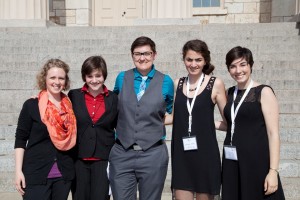Social justice foot-solider, Avinder Kaur Deol, shares her experiences of working to help marginalized peoples in our seventh article of “Kaur Careers”! Often times a lot of us just aren’t aware of all the career options out there. So, in an effort to highlight non-traditional career paths and to inspire Kaurs to explore different educational and job options, Kaur Life launched a new series called “Kaur Careers.”
Occupation: Social Worker
Education: Masters in Social Work, Masters in Health Advocacy
Describe what you do: Currently, I work at the University of Iowa coordinating a women’s leadership institute through the Women’s Resource & Action Center, called Iowa N.E.W. Leadership. The aim is to get more women from diverse backgrounds into leadership positions, including elected office, to more accurately reflect the experiences, identities and concerns of all women in our society. It also strives to instill the values of service and civic engagement. Prior to my work at the University, I was employed as a Senior Housing Outreach Specialist for those experiencing street homelessness in New York City.
When and how did you realize this was the career path for you? I realized that social work was my calling while working towards my first Masters degree in New York. I began to realize that this field aligned best with my interests in social justice, diversity and equity for all members of society, particularly those communities who have been traditionally marginalized and oppressed.
What do you enjoy about your job the most? What I enjoy most is working with people and populations that our society has historically, and presently, undervalued. When those communities feel empowered, recognized, and engaged, I feel the most fulfilled.
Considering it is nontraditional, what were your parents’ reaction? How did you deal with their response? Like many parents, mine hoped that I would choose a career that was fulfilling and rewarding. I started out pre-med, but quickly realized my passion for social justice and change. My parents were skeptical when I chose to pursue graduate studies in advocacy and social work, as they were concerned of how financially secure I might be in my future. Though this field certainly isn’t one that is sought after for a high salary, my parents came to understand that my work rewards me in ways that money cannot. 
How do balance family and work and hobbies? At times, they seem like one in the same. Many of my outside activities are social justice oriented, so I find ways to blend both. At times, the work can be emotionally draining; I find outlets for self care through music and playing my guitar.
How do you feel Sikhi inspires your work? One of my most prized and sacred possessions is the Khanda that was made for my father when he was growing up in Africa. When I was in high school, he gave me this to wear on my chain, along with his Kara he had as an adolescent. These visible markers inspire everyday. Every time I see these, I am reminded of the courage and strength that is embedded in our history. Standing up against injustice and oppression for ourselves and others, a core value of Sikhi, inspires me everyday.
What elements of Sikh values are in your work? Seva. The work that I have been drawn to encompasses so many Sikh values. Selfless service to and with others, volunteerism and civic engagement are all aspects of the diversity, leadership and social justice work I do. Whether it’s working to create a more inclusive environment for LGBTQ individuals, access to affordable housing, or teaching tools for political leadership, I always approach my work with an attitude of openness, acceptance and non-judgment. I believe we all possess privilege–including things we’ve worked for and things that we were born into & with–and it’s our duty to use those privileges for change and equity, even if they don’t directly benefit our own identities.
What lessons have you learned about Sikhi through your work? I have learned that so many of the tenets and values of Sikhi align with my values as a feminist and social worker. In that, I have recognized that these shared values have the power to bring diverse communities together.
What advice do you have for young Kaurs who are unsure of what career they should pursue? Follow your passions– It can be challenging as you weigh the influence, or perhaps pressure, from family and communities, but ultimately, your path will lead you to where your heart lies. Take risks– Sometimes we make plans for our future, but life takes us off that course and we are presented with new challenges and opportunities. Seize them! No matter which career field you choose, or perhaps more accurately, no matter which career chooses you, look to find ways in which you can include Sikhi and your values. Sometimes it is difficult to be what you can’t see (lack of visibility of other Kaurs and role models); don’t be afraid to forge your own path.






